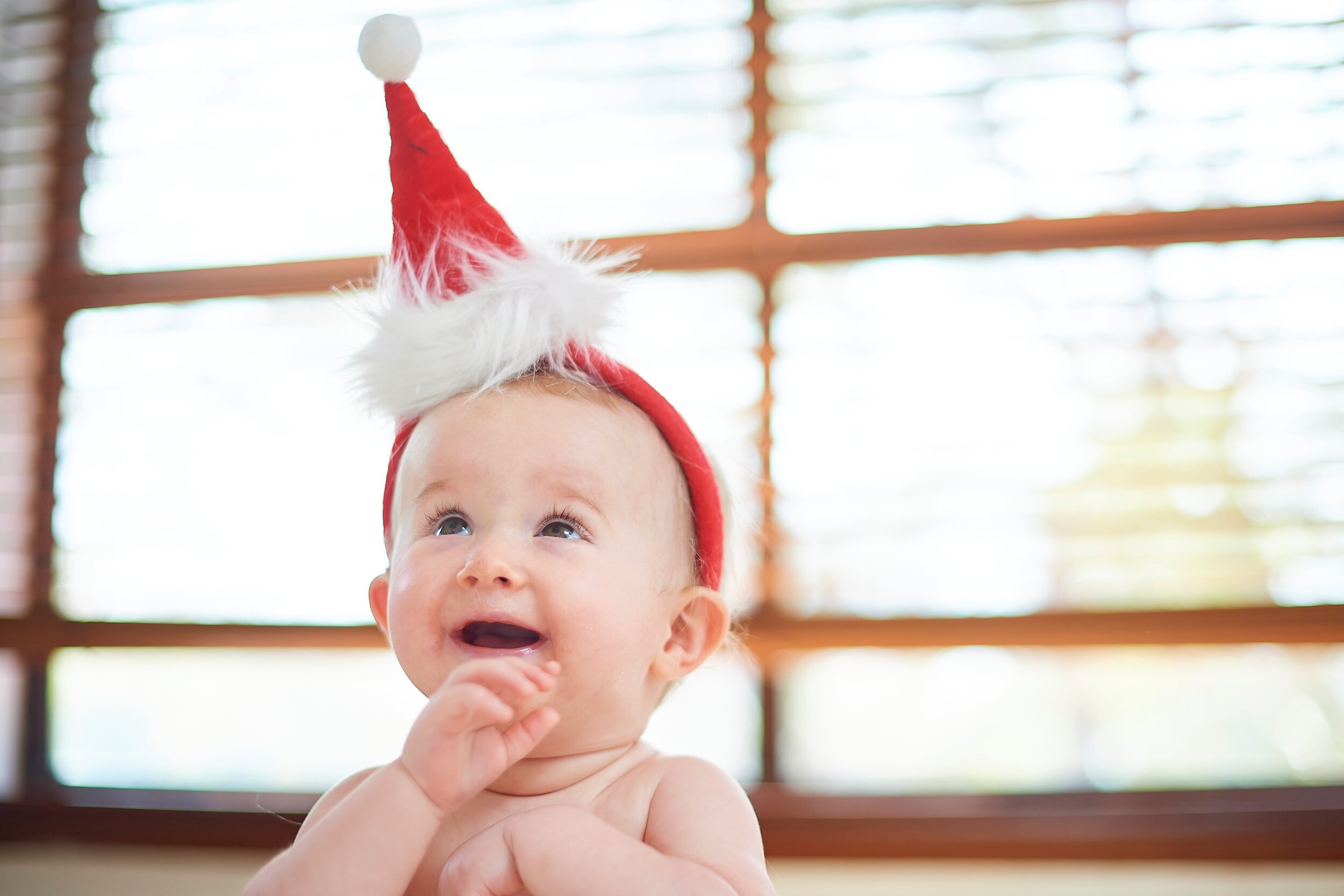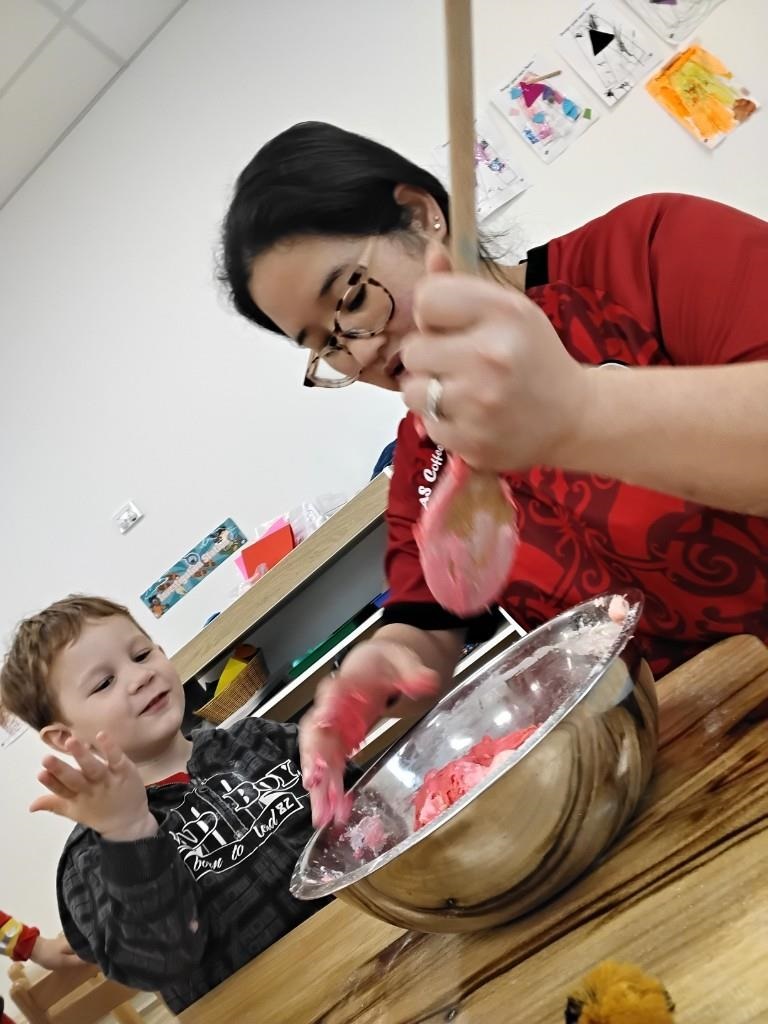
Spending the last two decades working with young children in a teaching and family daycare capacity, Stephanie Bull aka The Baby Sleep Teacher has learned how to effectively manage a baby or toddler’s day. Her secrets lie in managing a child’s level of stimulation and having adequate rest. Apply the below practical and easy to tips to survive Christmas Day!
Tip 1 – Less is more
This tip is all about managing the amount of stimulation your little one is exposed to. From a baby or toddler’s preceptive there is a lot to mentally process on Christmas Day. Opening gifts, realising Santa has come, learning about their new toys, family gathers, holiday feasts and maybe even a Christmas Day swim! When faced with too much activity, children become overstimulated and quickly become grumpy and overtired. When a child becomes overtired, they have a very difficult time settling to sleep.
When planning for Christmas Day, less is more! Minimising your little one’s level of stimulation will help you get through a very long Christmas Day! Prioritise your day into “must do” versus “potentially not practical” activities. The less you do, the more you are going to get out of your children.
Tip 2 – Late nights equal early mornings
With the excitement of Santa’s arrival and opening presents who could blame a child for waking early on Christmas morning. To cope with an early morning, have an early bedtime on Christmas Eve! When a child stays up too late, they become overtired and a hormone called cortisol is released into their brain. With cortisol swirling around a child’s body, falling asleep and staying asleep become very difficult and ultimately cause a child to wake early and feeling overtired in the morning. Not a great combination for a little one when faced with a long Christmas Day ahead.
Tip 3 – Spot tired signs
Knowing your child’s early tired signs make nap and sleep time much more manageable. Both babies and toddlers have an easier time falling asleep when they are not overtired so act quickly when you spot an early tired sign. Glazed eyes and staring intently at an object are the most common early tired signs for a baby between the ages of 4-12 months. For a toddler between the ages of 1-3 years of age, common tired signs are a long stare and a quiet moment.
Tip 4 – ChristMUST naps
Napping on Christmas Day is a MUST! If your Christmas Day plans find you travelling to another home, then plan for your little one to nap in a pram, car seat, swing or even on Mum. The most important thing is that your child naps! Planning ahead and building in nap time will ensure you have a happy content child on Christmas versus an overtired, grumpy and screaming one.
Tip 5 – Build in down time
It is very normal for a child to become overwhelmed with feelings of excitement, joy, frustration and even sadness on Christmas Day! An effective way for a child to cope with feeling overwhelmed is to have some down time. Down time in a quiet place, away from all the noise and stimulation that is Christmas Day, allows a child to deal with their big emotions and the sensory overload they are experiencing. After recharging, a child can re-join the festivities. Some children may need to escape to a quiet place several times to cope with the stimulation and excitement of the day.
Tip 6 – The Grinch…Be prepared
The Scout’s motto “Be Prepared” is one slogan to consider when organising for Christmas. With most shops closed on Christmas, it is important to have anything you’ll need for your kids. No one wants to leave the festivities to fetch nappies and wipes so in the days leading up to Christmas ensure you are well stocked. I know in most families Mum or Dad would resemble The Grinch if they were faced with having to go find an open shop.
Tip 7 – Murphy’s Law and presents
When it comes to Christmas morning, overindulging young children with too many gifts can quickly lead to disaster. From a baby or toddler’s preceptive, every gift they receive is another new toy they must mentally process. Young children easily become overwhelmed and overstimulated and when in this state, become tired and grumpy very easily. The difference between a happy child versus an overstimulated one may only be a few gifts.
After buying the best possible gifts for your child, they will prefer to play with the wrapping and the box, it is just Murphy’s law! The wrapping and the box are always less stimulating than the gift itself and it is no wonder children gravitate to them after a long Christmas Day.
Tip 8 – The Christmas feast
Introducing a plate full of new foods on Christmas Day would be a lot for a baby or toddler to mentally process and even digest. New foods also pose the risk of a child being allergic to something on their plate. To cope, keep your child’s Christmas Day meals simple and familiar for them. When planning include dishes, your child has ate before and will happily eat again. Christmas Day is stimulating enough without having to sit down to a whole new plate of food.
Tip 9 – Relax and have FUN!
Staying calm and being relaxed about how Christmas Day unfolds will help you and your child cope with the day. This is important because young children pick up on your emotions. When you are relaxed your baby or toddler will be too. The same goes if you are feeling anxious.
A child’s ability to pick up on their parents emotions often cause problems at bedtime. When babies and toddlers sense their parents are feeling anxious about them falling asleep, they began to feel anxious too. If this resonates with you, take deep breaths, and put your little one down when you are feeling calm and confident about the situation. It is always better to place your child in their bed in a calm and confident manner then to hesitate halfway through.
Tip 10 – Cuddle Magic
Who does not love a cuddle from a sleeping baby? One of the last memories I have of my late mother is of her rocking my girlfriends baby girl to sleep. My Mum was fighting cancer and cuddling a baby made that evening easier to deal with the pain. After a year where we have all suffered from a global pandemic, a cuddle from a sleeping baby maybe the best gift you could give a family member this Christmas.
The last nap of the day is generally a catnap for a baby. This is the perfect nap for a cuddle! The following day return to your baby’s normal method of falling asleep to ensure they do not become dependent on being cuddled or rocked to sleep.
Tip 11 – Sleep training on Christmas Day…No!
Guaranteed when you have a baby, and meeting family and friends someone is going to give you baby sleep advice. Starting sleep training on Christmas Day just adds unnecessary stress to a parent and their baby after a long day. When Christmas is over, and everyone is rested then is the time to teach new sleep habits. When working with clients I always say, “a sleep problem is not a problem, unless it is a problem for you!”
Tip 12 – When ALL goes pear shaped
After two decades of working with children and caring for multiple babies and toddlers in my home, I have realised that after a long stimulating day sometimes things will just goes pear shaped! Children do get tired and who can blame them after an eventful day. When things start to go pear shaped, the key to managing the situation is to move quickly either to sleep time or down time. Staying calm and managing the calm before the storm will help you and your little ones out.
All wrapped up in a blog
The ideal Christmas Day routine should mirror any other day for a baby or toddler. The practicality of this is not always possible. Going with the flow with a young child’s Christmas Day routine and adapting to the hustle and bustle of the holiday will build resilience for your child and allow you and your family to enjoy the day!
Stephanie is originally from Canada and has been living in Perth for 8 years. Prior to living in Australia, she taught at a private international school in Dubai. Stephanie and her family are often found in the East Fremantle area where her husband operates his coaching business Tennis Factory. For more baby sleep information, you can follow The Baby Sleep Teacher on Instagram and Facebook.
Article originally posted on The Baby Sleep Teacher website.



